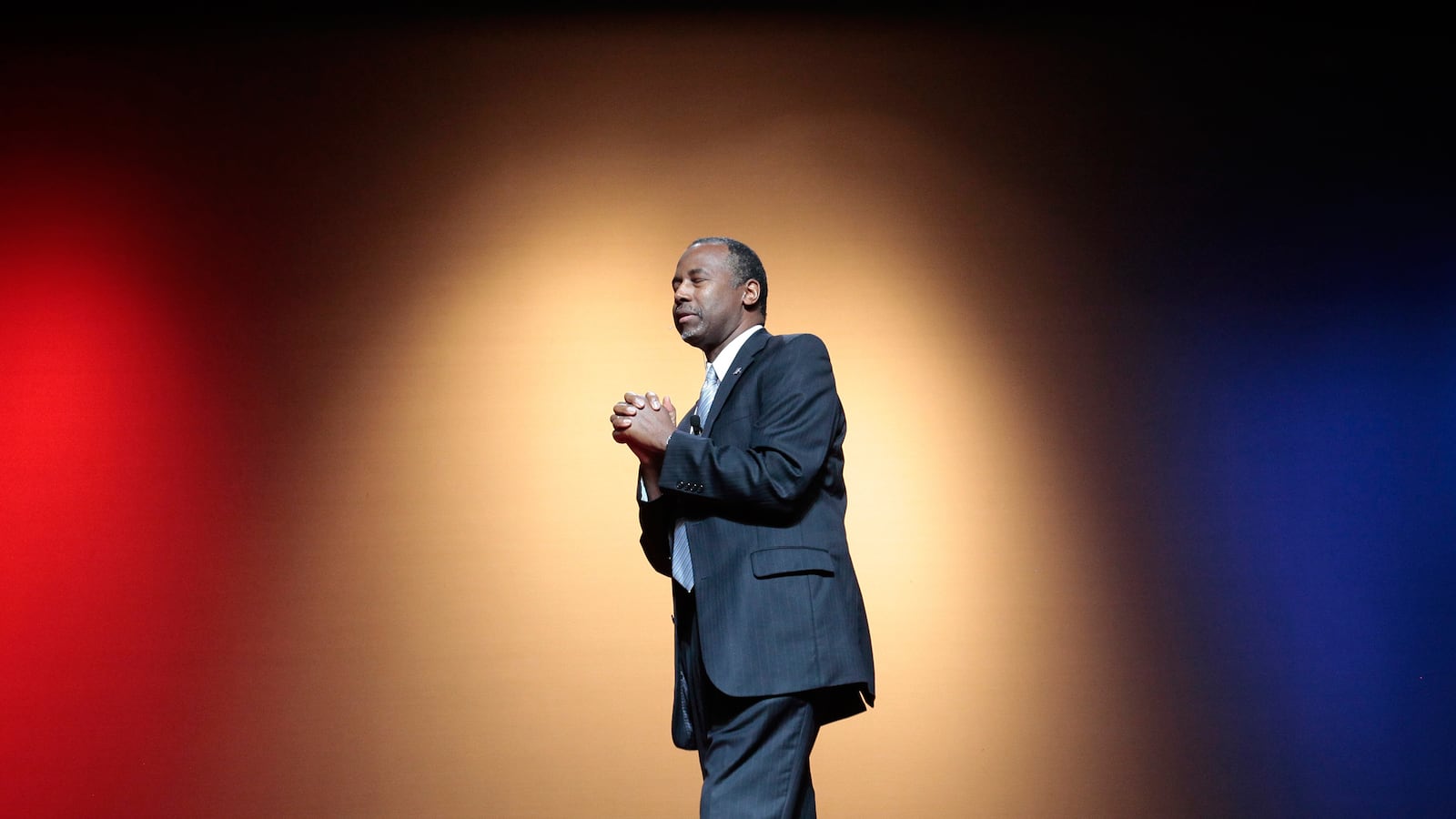Perhaps more than any other modern-day presidential contender, Ben Carson’s public life is broken in two dramatically different parts.
These days he makes news exclusively for his political involvement, which continued Monday with the formal announcement of his long, long, long-shot presidential bid.
"If God ordains that we get into White House, we're going to change the government into something more like a well run business," he told a packed crowd at the Detroit Music Hall on Monday.
He’s won commensurate adoration from Tea Party activists and contempt from Think Progress types for his internet-trolleque rhetoric.
For instance, the retired neurosurgeon once said the Affordable Care Act will have a worse long-term effect on America than 9/11 and also suggested its evils are topped only by slavery.
But the divisive former surgeon used to bring everyone together.
Before his presidential dreaming, and his Fox News stardom, and before his headline-making (and controversy-creating) speech at the 2013 National Prayer Breakfast, Ben Carson was already fabulously influential.
In 1987, when Marco Rubio was bro-ing out at South Miami Senior High School and Scott Walker was a mullet-sporting college student at Marquette University, Ben Carson became the first person to separate conjoined twins connected at the head.
But his inspiring tale doesn’t start there.
Carson’s astonishing rags-to-riches story began in Detroit, Michigan. Soon after he was born in 1951, his parents divorced after his mother learned that his father had a secret second family.
His mother, single with two children to support, cleaned houses to keep the family afloat.
His grades in high school and SAT scores soared so high that both Harvard and Yale offered Carson scholarships. He picked Yale and majored in psychology there. He later went on to the University of Michigan to get his M.D.
In his autobiography, Gifted Hands: The Ben Carson Story, Carson details how his Christian faith impacted his decision to go to U of M.
“Carson, aren’t you worried?” one of his friends asked him during their senior year of undergrad, as they were discussing post-college plans.
“No,” Carson replied. “I’m going to the University of Michigan Medical School.”
“How can you be so sure?” his friend replied.
“It’s really simple,” Carson said. “My Father owns the University.”
“Actually, I had been teasing, and maybe it wasn’t playing fair,” Carson adds later in the text. “As a Christian, I believe that God--my Heavenly Father--not only created the universe, but he controls it. And, by extension, God owns the University of Michigan and everything else.”
During his time in school, Carson worked a variety of unsexy jobs, including as a supervisor of a highway trash collection crew.
But his medical genius showed early.
As a student at U of M he created a new way for neurosurgeons to find a small hole at the base of a patient’s skull called the foramen ovale.
Doctors started using the technique, which saved them time in surgery.
After getting married and finishing med school, Carson went into brain surgery.
His career may have began in Michigan, but it blossomed in Maryland.
There, he became Johns Hopkins’ director of pediatric neurosurgery, and had an unparalleled tenure there as a surgeon.
Besides his historic separation of the Binder twins conjoined at the head, he reintroduced the hemispherectomy procedure to modern medicine by removing half of the brain of a four-year-old girl named Maranda Francisco who was suffering from brutal seizures.
The remaining side of Francisco’s brain took over the functions of the removed side, thanks to the brain’s plasticity. The Washington Post reported that at age 18, Francisco lead “a remarkably active teenage life – dancing, taking karate lessons, firing off e-mail”.
“Plasticity is something pediatric neurologists have known about for a long time,” Carson told reporters during a reunion of patients who had successfully undergone hemispherectomies, per the Los Angeles Times. “But no one knows the mechanism by which it occurs.”
He became a hero.
Cuba Gooding Jr. played him in a TV movie and playwright Carole Graham Lehane adopted his autobiography for the stage.
Thousands of students saw it performed.
He even gained several mentions in the hit Baltimore-based HBO drama The Wire as someone the down-and-out characters aspired to become.
On Monday, he weighed in on the unrest in his adopted city and said the people there had simply lost hope.
"They don't feel that life is going to be good for them, no matter what happens, so when an opportunity comes to loot, to riot, to get mine, they take it, not believing that there is a much better way to get the things that they desire," Carson said.
And while his political future is unlikely to soar to the heights of his medical career, Carson will have an interesting role in the ever-expanding GOP field - both as the only African American and as the field's candidate with the least electoral experience.
And at the very least, he'll be able to make lots of jokes about how running for president isn't brain surgery.
“I don’t have a lot of experience busting budgets and doing the kinds of that have gotten us into all the trouble we are in now,” he said on Monday. “I do have experience in solving problems. Complex surgical problems that have never been done by anybody before.”






